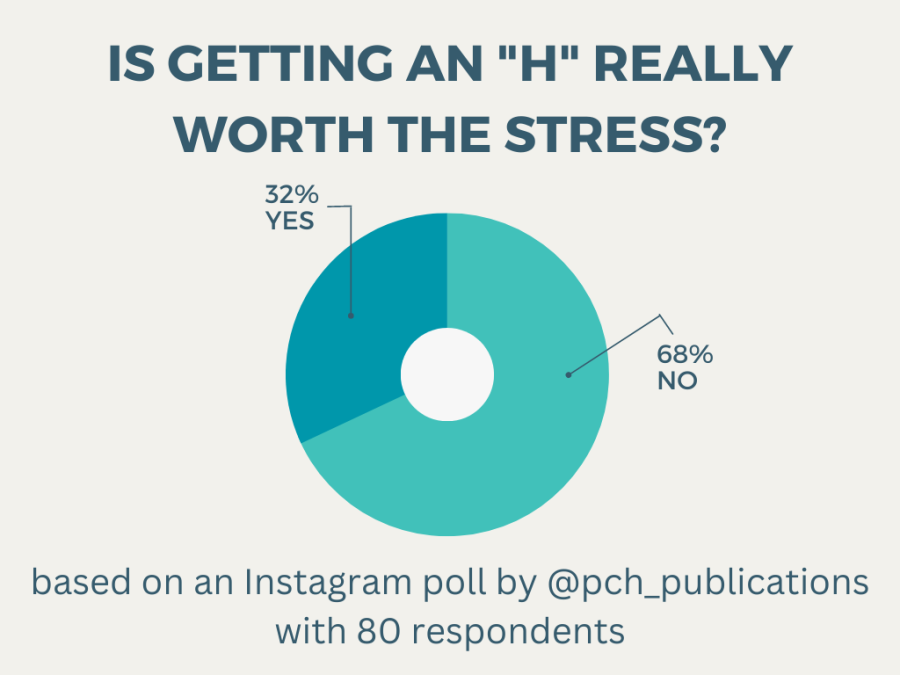What The H?
A growing debate over how our grading system should be structured
Infographic by Maya Sagett.
February 24, 2023
As it is known among teachers, counselors, and students alike, we are approaching that time in the year when the first grades of the semester are rolling in, juniors are beginning to zero in on thoughts of college, AP exams are scarily around the corner, and there’s one thought in the back of everyone’s mind: their GPA. The conversation concerning the GPA boost for honors students has been a long-running debate, and talks of really making a change are beginning to creep up to the surface.
Students that take honors courses may do it for a myriad of reasons: a needed challenge, more in-depth learning about a subject area of interest, or simply the chance of earning a 5.0 on their transcript. But has the potential of earning a higher GPA by getting a 97% really worth the stress that comes along with it?
“Kids feel a crazy amount of pressure (self-imposed or not) to get the H because it helps their GPA,” math teacher Nathan Wilson said. “But getting an H is almost being perfect, so I don’t think that it’s healthy for a kid to really stress about getting a 97%.”
On the other hand, though, for some students who need that extra challenge, the push toward getting a nearly perfect grade can be something positive to reach for, according to English teacher Jeff Rogers.
“It’s absolutely necessary,” Rogers said. “Even if some colleges don’t look at them, I think it’s a great goal for a lot of kids. Typically, many English teachers round 94s or 95s up to Hs to address the difficulty of getting a 97.”
As well as something for motivated students to strive towards in their honors classes, wanting to get the GPA boost from an H also has the added benefit of balancing out some of those lower grades that can come with the rigor of more difficult courses.
“Students are many times awarded for putting forth extra effort or doing something better than the average,” math department chair Kurt Lehmann said. “The H grade in one class can help an honors student who gets a B or C in a different honors class. It can balance their GPA so that they are encouraged to take more challenging classes, better preparing them for college.”
Another piece of this great GPA debate is the distribution of GPA when it comes to pluses and minuses in a class. Many people think that since there is such a large deviation of grades in a single letter grade, there should be an actual reward for a student getting a plus compared to one with a minus, when currently both students would receive the same GPA for vastly different performances in that class.
“I think the system we currently have is pretty good, though personally, I would like to see all honors courses have a 1.0 boost rather than just the 0.5 boost,” Lehmann said. “I also think that in normal classes I would like to see the different GPAs for a B+ or a B-. However, that may add too much stress to students. There is just such a vast difference between someone who earns an 80% and someone who earns an 89%”.
Overall, the value that students and teachers place on grades has been blown way out of proportion, and kids are sacrificing their mental health, social lives, and that freeing enjoyment of high school, all to see that shiny letter H appear on a piece of paper at the end of the year.
“Sometimes a grade can represent what a student learned, other times it can represent work ethic, and it could even just represent how well students take tests or play the game of school,” science teacher Shana Kelley said. “In my perfect world, I would have students learning for the love of knowledge and they wouldn’t have grades. Tests would be used for teachers to discover and address concepts that were missed but in the end, we all go to school because we see the value in learning.”



